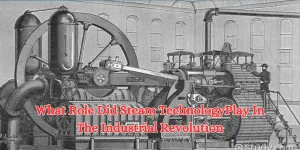What Role Did Steam Technology Play In The Industrial Revolution
The Industrial Revolution marked a turning point in history, driven in no small part by the revolutionary role of steam technology. This article navigates the intricate web of advancements and societal shifts brought about by the relentless power of steam.
Early Days: Steam as a Novelty
Steam Engines Emergence
In the early 18th century, steam engines emerged as novel inventions. Thomas Savery and Thomas Newcomen laid the groundwork with primitive designs, setting the stage for more sophisticated developments.
Watt’s Ingenious Contribution
James Watt’s Transformative Improvements
James Watt’s ingenious improvements in the late 18th century elevated steam engines to new heights. His innovations significantly increased efficiency, making steam power a practical and indispensable force.
Industrial Application: Driving Progress
Steam Engines Revolutionize Industry
As steam engines gained efficiency, they revolutionized industries. Factories, mills, and transportation systems underwent a paradigm shift, boosting production capabilities and enabling unprecedented economic growth.

Societal Impacts: A Changing Landscape
Social and Economic Transformations
Steam-powered advancements not only fueled industrial growth but also brought about societal transformations. The nature of work, urbanization, and the distribution of wealth all underwent significant changes.
Challenges and Innovations
Overcoming Challenges and Technological Innovations
The era wasn’t without challenges. From safety concerns to the need for better infrastructure, overcoming obstacles became crucial. Technological innovations addressed these issues, paving the way for further progress.
Legacy of Steam Technology
Enduring Legacy and Modern Applications
The legacy of steam technology persists today. Beyond its historical impact, steam power laid the foundation for subsequent technological revolutions and continues to find applications in modern industries.
In summary, the role of steam technology in the Industrial Revolution cannot be overstated. Its evolution from a novelty to a transformative force shaped the course of history, leaving an enduring legacy that echoes through the fabric of modern society.
Molecular Corrosion Technologies:
Molecular corrosion technologies represent a cutting-edge approach to combatting corrosion, a pervasive challenge across industries. By leveraging advanced molecular techniques, these technologies offer precise and efficient corrosion protection, ensuring the longevity and reliability of critical infrastructure. As industries seek sustainable solutions, molecular corrosion technologies stand out as a promising frontier, heralding a new era in corrosion prevention.
